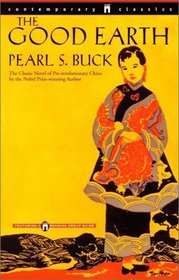Helpful Score: 11
Beautifully rich in writing, this epic novel tells the tale of man you'll love and hate, and love again. You'll feel for him as he struggles, cry with him as he despairs, and cheer with him as he triumphs. It's a good comment on the class system in place in China at the time, but also a comment on perseverance of spirit and integrity of character.
Helpful Score: 9
I hadn't read this book since 8th grade. Now, 25 years later, I read it again and weep with the beauty of this book. Love, tolerance, deception, greed, pride all flowing as poetry. If you haven't read this book since high school, you, now as an adult must re-read to truly appreciate what makes this book the classic it is.
Helpful Score: 6
I read this book for a book club that I was participating in. I found it to be very thought-provoking, and a great choice for a book club. One particular topic of interest to discuss in our club after reading the book is the perception of and treatment of women in the time of the book vs today.
Helpful Score: 5
You know, I've never lived on a farm - in fact I think I'd hate it - but I'm finding I love novels about farming and communing with land. They're very...(shudders) grounding. I really wish that weren't a pun, but it's the best word I know to describe it, and I suppose it helps explain the metaphor of spiritually settling things being described as grounding. The point is, I feel very settled at the moment.
Buck writes in a very stylized, almost awkward English that helps set the mood. It works, of course, in the subconscious expectation (at least I have) to hear about life in China in a stilted language, but it also evokes an almost biblical feeling, especially in her heavy use of repetition of the same words for the same things, over and over, and the repetition of phrases close together in a limited vocabulary.
Anyway, I don't want to spoil anything for anybody, but you're going to get Wang Lung, the simple farmer made good, and you're gonna get him warts and all, and you're gonna like him and you're gonna like him more and you're going to want things for him and you're gonna be sorry when the book ends.
And you're not going to be surprised that the book is called The Good Earth.
Buck writes in a very stylized, almost awkward English that helps set the mood. It works, of course, in the subconscious expectation (at least I have) to hear about life in China in a stilted language, but it also evokes an almost biblical feeling, especially in her heavy use of repetition of the same words for the same things, over and over, and the repetition of phrases close together in a limited vocabulary.
Anyway, I don't want to spoil anything for anybody, but you're going to get Wang Lung, the simple farmer made good, and you're gonna get him warts and all, and you're gonna like him and you're gonna like him more and you're going to want things for him and you're gonna be sorry when the book ends.
And you're not going to be surprised that the book is called The Good Earth.
Helpful Score: 4
I read this book many years ago, probably for school. I really liked it then, so when it was chosen as an Oprah book and I saw it in the store I picked it up to glance through it. Imagine my surprise when I was drawn in from the first page and so I bought the book. It was a nice surprise to reread this classic book and enjoy it as much as I did.
The story of Wang Lung, a poor farmer, and his wife O-lan is set in the time of the last Emperor and moves up to the start of the People's Revolution. It is a story filled with drama, love, loyalty, betrayal, perseverance and more. We come to care about Wang and O-lan and their extended family as they struggle with famine, drought, flooding, plague and more and yet always persevere, until achieving success beyond their dreams. This book was published in 1931, yet it doesn't feel dated at all. I am very glad I chose to read this book again.
The story of Wang Lung, a poor farmer, and his wife O-lan is set in the time of the last Emperor and moves up to the start of the People's Revolution. It is a story filled with drama, love, loyalty, betrayal, perseverance and more. We come to care about Wang and O-lan and their extended family as they struggle with famine, drought, flooding, plague and more and yet always persevere, until achieving success beyond their dreams. This book was published in 1931, yet it doesn't feel dated at all. I am very glad I chose to read this book again.




